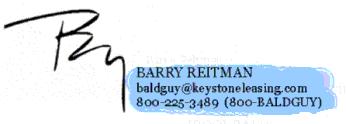“The Evergreen Lease”—Legal but unethical by Barry Reitman
If ever there was an aspect of equipment leasing which juxtaposed the legal with the unethical, the “evergreen clause” would be that area. An evergreen clause, or evergreen lease, as the word implies, signifies a contract that goes on forever. In actuality it can end, but only after the lessee sends, within a specified time period, a letter stating his intent to return or purchase the underlying equipment. In practice, the procedure is deliberately made cumbersome by the lessor. Hence, 63.4 percent of the time (78.6 percent of all statistics are made up on the spot) the lessee unwittingly pays far in excess of the total price to which the parties agreed. Let's go through a typical situation: A fair market value option lease of a $48,000 machining center is offered to the prospective lessee; sixty payments of $984. He asks the meaning of “fair market value.” The sales rep tells him, “That means that you will own it for ten percent of the original cost at the end of the lease.” That commitment to a residual assumption of ten percent may or may not be specified in the lease contract. Fast forward five years. The lessee calls the lessor (or the party who has purchased the portfolio in which the lease resides), and asks if he should include the $4,800.00 purchase option amount with his last payment, which will be mailed that week. He is told that his lease has been renewed for an extra year because he did not send in a certified letter ninety-one days before the end of the term. The words of the glib sales rep regarding “you will own it for ten percent….” are ringing in his ears. Unfortunately, they are not written in his contract. Not wanting to be bitten twice by the same contract, he begins paying for the extra year, immediately sending the certified letter indicating desire to purchase. Fast forward twelve months. He calls again, asking about how to send his purchase option payment. “Sorry,” he is told, “your contract spells out that the letter had to be sent no less than 90 and no more than 120 days before the end of the renewal term.” Twelve months later, after diligently complying with the certified letter trap, our poor friend calls again to ask how to remit the $4,800. “Sir, the fair market value of your equipment is $20,827.87. You can remit that with your last rental payment.” The history and original rationale of evergreens is rather innocuous. Main frame computers and other mid to high ticket items were quoted as true or operating leases. The “rental” payment was, indeed, just that. While there may or may not have been an option to purchase, all parties were agreeing to a contract which clearly spelled out rights and responsibilities, including end-of-lease requirements. Renewals were an integral part of the industry, and were, for the most part, fair and reasonable. More to the point, the equipment was part of the lessor's fleet. He had every expectation of realizing the residual value, and could only do so if the lessee was contractually committed to give enough warning; e.g., 90 to 120 days, so that he could find a new lessee for his rental equipment. Today's equipment leasing marketplace, however, particularly for small ticket transactions, is one in which “you-own-it-at-the-end” trips off the tongue of sales reps on almost every transaction. The evergreen clause on small ticket fixed option contracts is not only an anachronism, it is also an unfair advantage for scoundrels. And, yes, some even try to make use of it on one dollar purchase option leases. (Go explain THAT with a straight face.) To the extent that our leasing industry has a black eye, and it does, this issue is a big part of it. The inherent dishonesty of creating roadblocks to keep someone from getting what he bargained for cannot be defended. What's a lease broker to do? Determine the practices of your funding sources. At Keystone Equipment Leasing, we refuse to deal with those who don't give us assurances that they do not play the game. A solid compromise (and one which is good practice for lease brokers in any case) is to sell only the stream of payments to your funding sources on leases which have residuals. In addition to precluding any chance of "evergreening," this gives you a reason to call your lessee at the end of the term to promote more business. It also smoothes out the peaks and valleys of business cycles. Ask any old-timer. Many of us weathered serious economic storms by depositing those purchase option checks. Another, more difficult, choice is to offer one dollar and fixed PUT leases exclusively, unless requested otherwise. And then, if an FMV lease is requested by the customer, highlight any potentially "evergreenish" clause to your lessee. We have taken these measures on all small ticket quotes. Why is that? Several small reasons, and one big one. The small ones regard the sound of “and then you own it” as an attractive marketing phrase, and the fact that everyone – everyone! – has either been burned, or knows someone who has been burned, by an evergreen clause. The big reason is this: You cannot compete with someone who is banking on an extra year or two of payments. In the example above,* with one additional year of payments, the lessee will end up paying out an extra $11,808, and the unscrupulous "evergreener" has more than $6,600 excess profit (present value) in the deal. Educate your customers? Sure, some will understand. But, others will have images of Humphrey Bogart talking about stolen strawberries as you do your explaining. This is not where you want to be as you make your sales presentation. Fortunately, the benefits of Section 179 tax deductions make fixed nominal purchase options a good product for most small ticket transactions. With 2006's $108,000 availability, your smaller customers will appreciate the savings, and you will know that you have sold a quality product that will lead to repeat business.
Barry Reitman, Biography In 1983, Barry and his late wife and partner, Rita Marder, founded Keystone Equipment Leasing, Inc. in Bergen County, New Jersey. The firm, which specializes in small ticket equipment leases, relocated to Blooming Grove, New York in January, 2000. While maintaining a strong relationship with local and regional vendors and lessees in the New York/New Jersey area, it has also become an active presence on the internet. Keystone's website has been actively, and so-far successfully, avoiding the slings and arrows of outrageous scammers since 1996. Working closely with Federal and state law enforcement, Barry's documentation has been part of three successful fraud prosecutions, including one which was initiated by an alert from Keystone to the FBI. For a full biography, please click here:
|
 |


